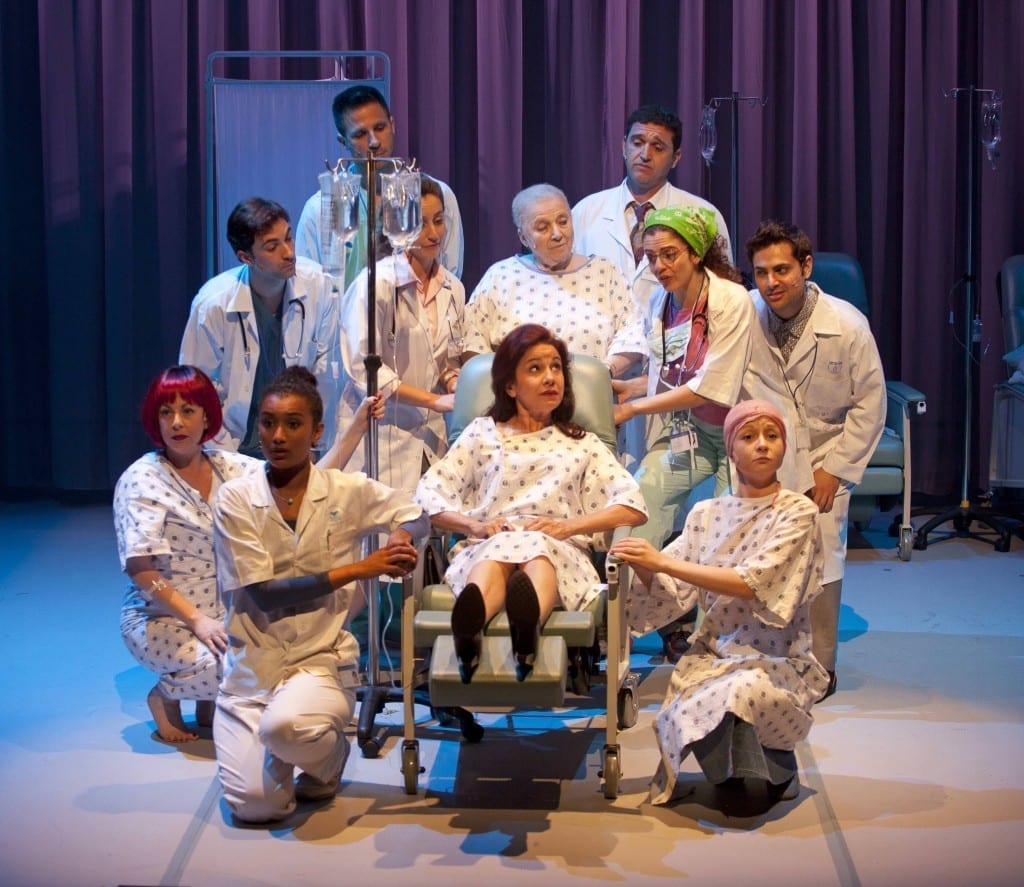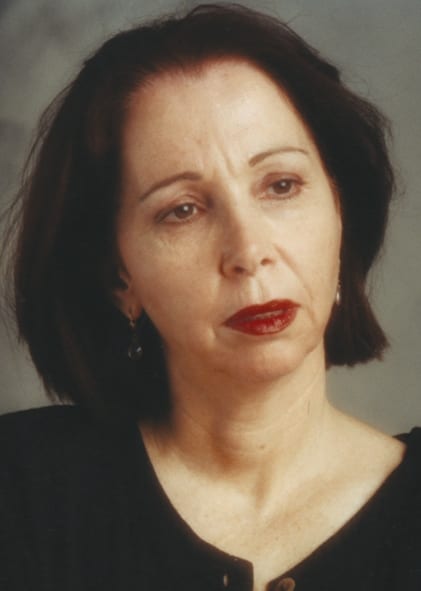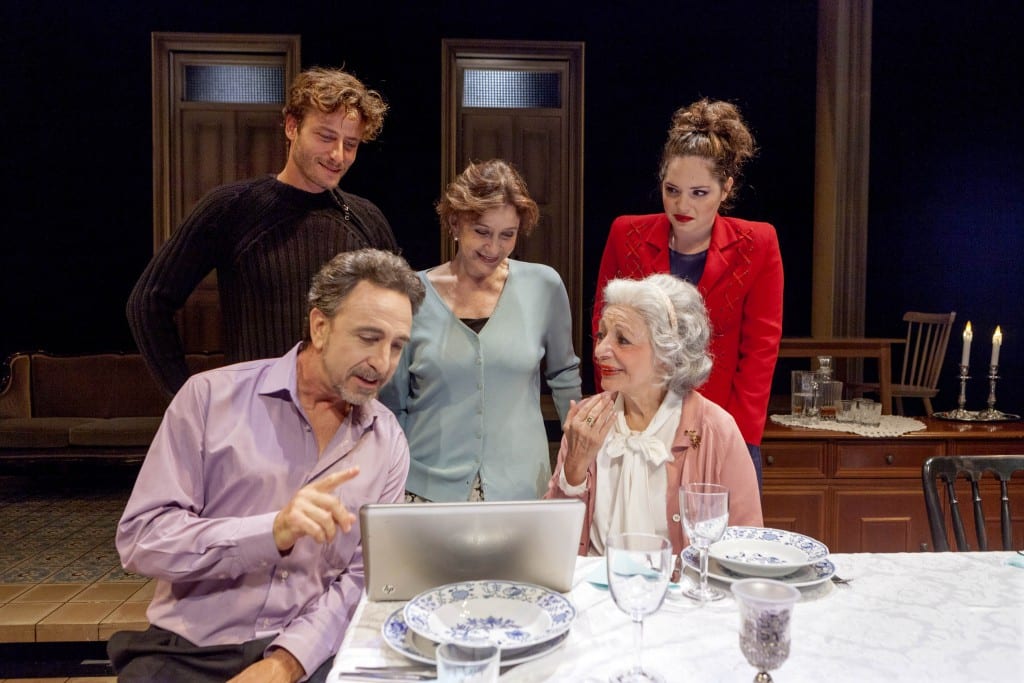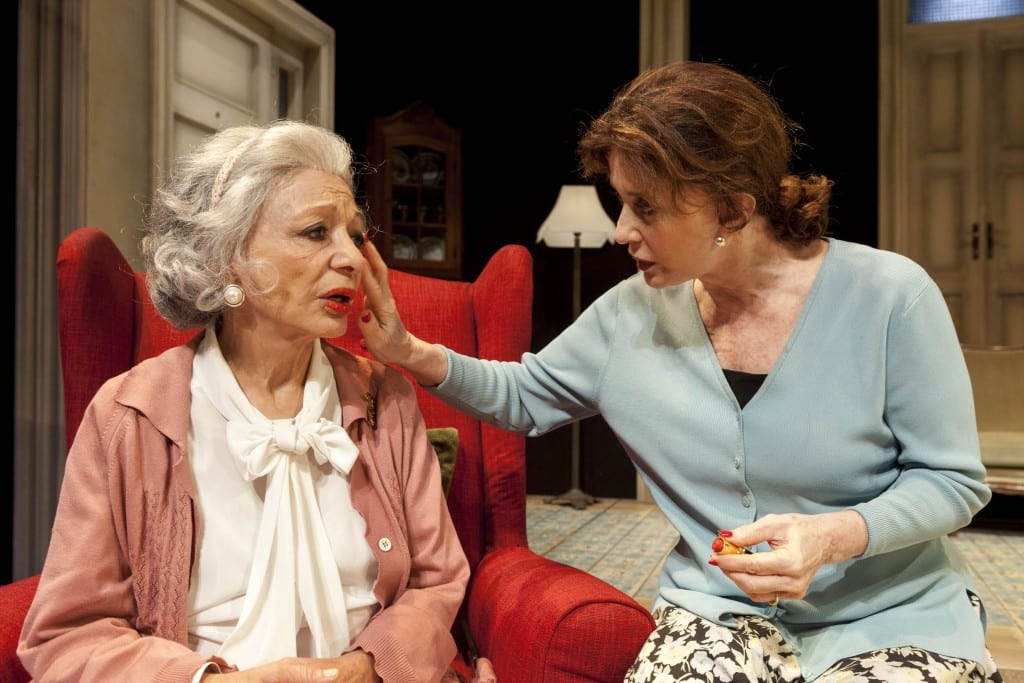Rivka Jacobson interviews Edna Mazya, an Israeli playwright and director who works at the Cameri Theatre in Tel Aviv.
RJ: Edna, thanks for agreeing to talk to me. Can you tell me what you are working on at the moment?
EM: My latest play The New Criminals is about how far a woman will go to survive economically when her family goes bankrupt. She gets the idea to after meeting a student who was working as a prostitute. What ensues is actually the best time of this woman’s life, as her husband has continually oppressed her. She finds a freedom with girls that understand her.
RJ: Does it reflect present social problems in Israel that you wish to bring to the forefront?
EM: I mainly wanted to tell this particular story, but it reflects the terrible economic situation in Israel generally. Every day, you can’t help feel the shame of those around you, too poor to function but too proud to talk about it. So in a sense the play explores a psychological situation. It is a comedy, but a sad comedy. A metaphor for how far we will go to survive.
I was inspired one day whilst getting a taxi. The driver said to me, “The only way you can survive today is by being creative.” The sentence stayed with me- “what did he mean?”. Suddenly this idea came up, this is being creative. A shy, delicate woman, wanting to do good, who contrasts with her world.
RJ: So you don’t see your plays as political vehicles?
EM: I use political situations, but I don’t have a political point of view. I believe people go into revolution or underground movements – as in my play The Rebels- mainly for the adventure rather than ideology. We want to be stimulated, to feel danger and risk. These are all inner things, inner feelings. I try to write plays that reflect situations, rather than actively try and change them.
RJ: Have your views changed and progressed over the years?
EM: Not really. Everything I write demonstrates my attitude to life. An example of this can be seen in Games in the Backyard, one of the most widely performed plays. It is based on the real story of a gang rape of a young girl of 11 by a large group of fifteen or sixteen year old boys. I knew I wanted to use the story, but the problem was I didn’t want to write about reality. I need a degree of alienation. I had the idea of 4 phases- when the children are young, when they are all attorneys, and then when she is young being investigated by the boys as the attorneys, and then finally her as her attorney investigating the boys. It has been very popular. It was performed at the Royal Court in London under the title of Fair Game. But I would never write anything so violent today. You grow up and the subjects change, like your life.
RJ: Fair Game was performed in London. Today, importation of Israeli art is often met with boycott and protest. How do you feel about this?
EM: To boycott artists is a mistake. They experience and try to convey the struggle. I do not think there are many artists in Israel who believe in the occupation. People hate, but it does not achieve a single thing. We are alone here, we need help. The real issue in this matter is those boycotting and protesting do not know, have not experienced the situation. People become very pleased with themselves, feeling they have picked a side, the right side, but it is more complicated than that.
RJ: Does Israeli theatre reflect a political reality?
EM: Sometimes you need to escape it through art, rather than always write about it. Personally, I don’t believe it. Changes in politics do not directly affect my drama. Unless you find a very special angle, a stylized angle, you cannot write about this sort of thing.
RJ: You have been to the UK, and around the world. How do you compare Israeli performing arts with other countries? Is it satisfying to see your productions alongside other countries?
EM: More people in Israel go to the theatre than to football! I am so happy about this. People here like the magic of the theatre- they like everything! The Cameri Theatre has six different halls. Visitors here cannot believe their eyes when they see how prosperous it is here.
RJ: What do you see for the future?
EM: I am directing a play, The Lovesick in Suburbia, which I have revived as a musical, it is very abstract. I have written another play about the theatre and actors, and the murder in Chekhov’s Uncle Vanya and it is called The Playwright.
RJ: Do you think a good playwright should also direct?
EM: No not necessarily. A director is a certain type of person; you have to be a leader. And not everyone can do this. But playwrights are often more shy. A certain personality can be a director, and I felt I could do that! Plus you need the talent, to see what the play can be.
RJ: Do you work closely with the directors of your plays?
EM: Oh yes, the director of my most recent play is great. He doesn’t let me jump in and talk during rehearsals- that is really difficult! He says to me “Six o’clock” which means, at six o’clock we will sit down and talk it through.
RJ: Do you think a good director should be a good psychologist?
EM: You need to be very generous and sensitive to your actors. You have to love your actors- I really love them. They are such special people. I think directing under terror is very dangerous. That old school style of humiliation is changing however, it is dying. You have to give actors space, but not embarrass them. I choose my actors carefully- I can’t work with students, non-professionals. Professionals are better at understanding what I want; I am not trained to direct students. I don’t know what to do, how to lead them. I did not study direction, so I do not have a method. The way I work is intuitive. I cannot sense as easily when something is out of tune.
RJ: Which playwrights have influenced your work?
EM: Chekhov, Chekhov, and Chekhov! I read him since I was a girl, I know the plays so well. I also taught theatre. I did an MA in Beckett, Chekhov and Pinter. The Seagull is one of my favourites. Of Pinter’s plays, Betrayal will always be iconic. The others are all very similar, but Betrayal will live forever. It is a communicative piece, it lives beyond the time in which it was written. That is something that interests me a lot- the spirit of time. End Game is my favourite Beckett. It broke my heart. However, I did have an idea to staging Waiting for Godot with women, as it represents the situation a lot of women are in here.
RJ: You have written several novels. How did you find that, in comparison to writing plays?
EM: For me it was very, very difficult. I enjoyed going overseas to festivals, but my memory of writing, particularly The Unsatisfied, felt very unnatural. It was a bad experience mentally for me, despite the fact it was successful. I have written three children’s books, for my grandchildren.
RJ: How did you start writing plays? How old were you?
EM: I was in university, studying theatre, and then I wanted to write my thesis, on the poetics of the banal. I was sat in the library studying, and I suddenly had this vision: ‘I don’t want to write about writers, I want to write myself!” It was so vivid, that I just knew I was not going to write my thesis. I wrote three screenplays, which a very radical director directed. They were difficult movies about homosexuality. That was in the 80s. A hard, alienated time. My first play was Vienna by the Sea, about some Jews from the Vienna, who go annually to the Adriatic Sea. In 1938, they visit, about it is about their personal problems, and with history in the background- for example they change the station when Hitler is on the radio. Then they return to Vienna, at the end of the play, unknowingly to a deathtrap.
RJ: Do you see theatre as escapism?
EM: For me, all art is about being in a higher place, about getting away. I live in my imagination. That is why it doesn’t suit me to be political, because my writing detaches itself from reality. Plus I always start from the character, not the issue. Characters are so important. Of course, I love to research. But people fascinate me more.
RJ: Do you plan your plays- beginning, middle and end?
EM: Thinking of the narrative takes a long time. Once you write, you need to know the main stations, where the play will go. Writing dialogue is easy. I don’t believe in didactic writing, I don’t lecture on things. Everything points to one direction.
RJ: Roughly how long does it take you to write?
EM: Always at least a year. Some are more difficult- maybe two years. If I love the idea, I am completely engrossed, it is like a journey, and it is ripe.
RJ: At 65, some might be contemplating retirement. How do you feel?
EM: I love writing. But the minute I feel I am not succeeding I will stop. My final goal in life is to go and become a Buddhist, but I could not go to an ashram in India, because I am so attached to my family. But, I would like to retire from people; I like to be alone, very much.
RJ: Would you come to the theatre?
EM: Maybe I will! But I need more time for contemplation, for meditation. I am not afraid of death, I am happy to think about it.
RJ: The play you directed, Happy Ending is coming to London?
EM: Yes, to the Arcola, from January to March. My very close friend Anat Gov wrote it. She wrote it when she was very ill, dying of colon cancer. She wrote some of her best works during her last years.

RJ: The play is very obviously about untimely deaths. But it is also so fantastically funny. How was it for you, directing a play that is so much about your close friend, Anat?
EM: Anat was in all the rehearsals. She was such a compassionate person, she never showed she was in pain, or struggled. She wanted the play to be performed. You have to remember that the play is about a happy ending, because the main character does not want to go through treatment, she wants to choose how to die. And that is how you achieve a happy ending.







